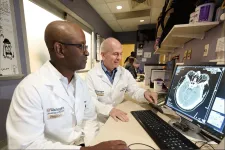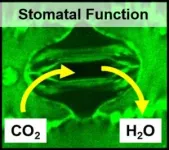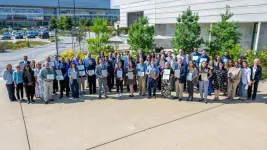(Press-News.org) Stroke patients who survive a blood clot in the brain’s blood vessels are prone to developing new blockages during their recovery periods, even if they receive vessel-clearing interventions. In an effort to avoid further clots, doctors at 57 sites around the U.S. tested a possible solution: the addition of anti-coagulant drugs to medicine that dissolves blood clots.
But results from the clinical trial, led by Opeolu Adeoye, MD, head of the Department of Emergency Medicine at Washington University School of Medicine in St. Louis, indicate two such drugs did not improve outcomes.
The findings are available Sept. 4 in The New England Journal of Medicine.
“We’re a little disappointed in the results,” said Adeoye, who is also the BJC HealthCare Distinguished Professor of Emergency Medicine. “But it’s meaningful to optimal patient care that we’ve answered the question definitively. Neither of the drugs helps prevent further clots.”
The goal of the Multi-arm Optimization of Stroke Thrombolysis (MOST) clinical trial that Adeoye led was to test the efficacy of adding argatroban, a blood thinner, or eptifibatide, which inhibits blood platelets from sticking together, to the routine intravenous thrombolysis treatment.
The trial closed the chapter on this potential use of these medications, but Peter Panagos, MD, professor of emergency medicine and co-author on the study, said that efforts like these inform future advances in medicine, including potential new anti-coagulant treatments.
“Without negative trials, we would not know how to design new trials,” Panagos said. “Future success is built upon the hard work of previous research effort.”
Physicians do not have a lot of treatment options for patients who experience a stroke. Some patients undergo a procedure to remove the clot. Others receive intravenous thrombolysis to relieve the affected blood vessel through clot-dissolving medication delivered to the bloodstream. A number of patients receive both interventions.
“Even with those treatments, over half of patients still have a significant disability three months after their stroke," said Adeoye, who treats patients at Barnes-Jewish Hospital and Missouri Baptist Medical Center and also provides stroke telemedicine consultation. "After you give the thrombolysis, the clot can re-form, which contributes to the stroke worsening or persisting.”
Preventing these clots with an additional treatment of anti-coagulant drugs seemed like a promising idea, especially as there are FDA-approved medications that earlier studies had suggested could be effective.
In the MOST trial, patients were randomly assigned to receive either argatroban, eptifibatide or placebo. Adeoye explained that the study had checkpoints built in to ensure that treatment outcomes were meeting efficacy thresholds in order to continue. The first checkpoint was set at 500 patients, which the team reached in 2023.
“When we looked at the data, it was readily apparent that neither drug was going to come anywhere close to our threshold,” he said.
In fact, the probability that either drug was helpful was less than 1%. Worse still, argatroban and eptifibatide were linked to greater incidences of disability and mortality within the three-month post-treatment observation window.
This correlation was not necessarily alarming; the safety monitors on the project found that the deaths appeared to have causes unrelated to the medications. The lack of improvement noted with the medications compared with what was noted with the placebo was reason enough to call off the trial.
There are more options to pursue in seeking to improve stroke outcomes. Adeoye said there are drugs in development that target different parts of the blood coagulating and clotting processes that may prove to be more effective than argatroban or eptifibatide, and other procedures such as direct arterial delivery through which such drugs might be more effective.
Panagos, who directs the new Section of Neurologic Emergencies in the Department of Emergency Medicine, added that WashU Medicine’s leadership in trials such as this one benefits the 1,700 stroke patients who are treated by WashU Medicine physicians at Barnes-Jewish Hospital every year.
“Because we are involved in and lead most of the key basic science and clinical research for stroke and cerebrovascular patients nationally and internationally, we can bring the latest interventions to our patients in St. Louis and help advance treatment and prevention strategies,” Panagos said. “Our involvement in clinical trials helps bring the highest quality, most innovative treatments to our community.”
Adeoye O, Broderick J, Derdeyn CP, Grotta JC, Barsan W, Bentho O, Berry S., Concha M, Davis I, Demel S, Elm J, Gentile N, Graves T, Hoffman M, Huang J, Ingles J, Janis S, Jasne AS, Khatri P, Levine SR, Majjhoo A, Pancioli A, Panagos P, Pizzella S, Ranasinghe T, Sabagha N, Sivakumar S, Streib C, Vagal A, Wilson A, Wintermark M, Yoo AJ, Barreto AD. Adjunctive intravenous argatroban or eptifibatide for ischemic stroke. The New England Journal of Medicine. Sept. 4, 2024.
END
Adding anti-clotting drugs to stroke care ineffective, clinical trial finds
Medications thought to show promise did not improve patients’ outcomes
2024-09-04
ELSE PRESS RELEASES FROM THIS DATE:
Research Center awarded $14.4 million to advance new manufacturing solutions for microelectronics
2024-09-04
A new Energy Frontier Research Center (EFRC), supported by the Department of Energy’s Office of Science and led by SLAC National Accelerator Laboratory, was awarded $14.4 million over four years to advance manufacturing of microelectronics by investigating approaches to building their components in fundamentally new ways.
Instead of moving electrons through conducting metallic interconnects in the miniscule and ever shrinking parts of devices such as microchips used in computers and cell phones, the researchers propose to move information via spin waves that can propagate through semiconductors ...
Notre Dame researchers create new tool to analyze embodied carbon in more than 1 million buildings in Chicago
2024-09-04
The built environment — which includes the construction and operation of buildings, highways, bridges and other infrastructure — is responsible for close to 40 percent of the global greenhouse gas emissions contributing to climate change.
While many building codes and benchmarks have focused on constructing “greener,” more energy-efficient new buildings, it is not enough to seek to reduce emissions in operations, said Ming Hu, the associate dean for research, scholarship and creative work in Notre Dame’s School of Architecture. Rather, policymakers and industry leaders ...
SMU researcher helps develop new technique to explore oceanic microbes
2024-09-04
DALLAS (SMU) – When SMU researcher Alexander Chase was a young boy, the sheer diversity of plants in Earth’s tropical rainforests fascinated him. He found himself wondering, what new species were out there, waiting to be unearthed? That curiosity is why Chase now collects samples from Earth’s oceans using a new technique called Small Molecule In situ Resin Capture (SMIRC), which could be the first step in uncovering compounds that lead to next-generation antibiotics.
Microbial natural products come from microorganisms, or microbes, and account for many of today’s essential medicines, including most antibiotics. Microbes are too small to see without ...
New guideline for Helicobacter pylori includes change to primary treatment recommendation
2024-09-04
The American Journal of Gastroenterology has published a new guideline on the treatment of Helicobacter pylori (H. pylori) infection.
The corresponding author on the guideline is William D. Chey, M.D., chief of the Division of Gastroenterology and Hepatology at Michigan.
H. pylori is a bacterium that infects over half the people in the world, though most are asymptomatic.
It can cause dyspepsia, peptic ulcer disease and gastric cancer.
This latest clinical practice guideline notes that its prevalence in North America is decreasing, but it still infects 30-40% of the population.
A previous guideline ...
Making desalination more efficient, by way of renewable energy
2024-09-04
(Santa Barbara, Calif.) — With freshwater becoming an ever scarcer resource, desalination of ocean water is increasingly employed to bridge the gap between supply and demand. However, desalination is energy-intensive, often powered by fossil fuels, so meeting the need for freshwater can exacerbate the challenge of reducing atmospheric CO2, the main driver of climate change.
Yangying Zhu, an assistant professor in the Department of Mechanical Engineering at UC Santa Barbara, wants to address that conundrum. Now, a two-year, $500,000 seed grant from the Advanced Research Projects Agency-Energy (ARPA-E) ...
Preventing car battery fires with help from machine learning
2024-09-04
One of the most critical safety concerns for electric vehicles is keeping their batteries cool, as temperature spikes can lead to dangerous consequences.
New research led by a University of Arizona doctoral student proposes a way to predict and prevent temperature spikes in the lithium-ion batteries commonly used to power such vehicles.
The paper "Advancing Battery Safety," led by College of Engineering doctoral student Basab Goswami, is published in the Journal of Power Sources.
With the support of $599,808 from the Department of Defense's Defense Established Program to Stimulate Competitive Research, Goswami and his adviser, aerospace ...
Heavy metal cadmium may be tied to memory issues for some
2024-09-04
MINNEAPOLIS – The heavy metal cadmium, which is found in the air, water, food and soil, is known to cause health problems. A new study published in the September 4, 2024, online issue of Neurology®, the medical journal of the American Academy of Neurology, examined if thinking and memory skills were associated with cadmium exposure. They found no association when they looked at the group as a whole. However, when looking at Black and white people separately, it found cadmium may be tied to problems with thinking and memory skills in white people. ...
Strictest abortion-ban states offer least family support
2024-09-04
View a breakdown of the abortion restrictions by state below
States with early abortion bans are less likely to offer paid time off after childbearing, to give poor children nutritional support or to expand access to reproductive health care
Marginalized people and those with low socioeconomic status are overrepresented in ban states and least likely to overcome the barriers that bans impose
CHICAGO --- States with the most severe post-Dobbs abortion restrictions also have the fewest policies in place to support raising families, reports a new Northwestern Medicine study.
“We found that in the states that most severely ...
Study: People facing life-or-death choice put too much trust in AI
2024-09-04
In simulated life-or-death decisions, about two-thirds of people in a UC Merced study allowed a robot to change their minds when it disagreed with them -- an alarming display of excessive trust in artificial intelligence, researchers said.
Human subjects allowed robots to sway their judgment despite being told the AI machines had limited capabilities and were giving advice that could be wrong. In reality, the advice was random.
“As a society, with AI accelerating so quickly, we need to be concerned about the potential for overtrust,” said Professor Colin ...
Leaders of ‘EV Ready’ Illinois cities recognized in ceremony at Argonne
2024-09-04
City leaders who are working to accommodate more electric vehicles (EVs) were recognized in a ceremony o Aug. 23 at the U.S. Department of Energy’s (DOE) Argonne National Laboratory. Utility ComEd and the Metropolitan Mayors Caucus spotlighted 12 communities in northern Illinois that recently completed the EV Readiness Program.
The EV Readiness Program trains and assists local government officials in taking concrete steps to support EV adoption. As a national leader in EV research, ...
LAST 30 PRESS RELEASES:
Cal Poly’s fifth Climate Solutions Now conference to take place Feb. 23-27
Mask-wearing during COVID-19 linked to reduced air pollution–triggered heart attack risk in Japan
Achieving cross-coupling reactions of fatty amide reduction radicals via iridium-photorelay catalysis and other strategies
Shorter may be sweeter: Study finds 15-second health ads can curb junk food cravings
Family relationships identified in Stone Age graves on Gotland
Effectiveness of exercise to ease osteoarthritis symptoms likely minimal and transient
Cost of copper must rise double to meet basic copper needs
A gel for wounds that won’t heal
Iron, carbon, and the art of toxic cleanup
Organic soil amendments work together to help sandy soils hold water longer, study finds
Hidden carbon in mangrove soils may play a larger role in climate regulation than previously thought
Weight-loss wonder pills prompt scrutiny of key ingredient
Nonprofit leader Diane Dodge to receive 2026 Penn Nursing Renfield Foundation Award for Global Women’s Health
Maternal smoking during pregnancy may be linked to higher blood pressure in children, NIH study finds
New Lund model aims to shorten the path to life-saving cell and gene therapies
Researchers create ultra-stretchable, liquid-repellent materials via laser ablation
Combining AI with OCT shows potential for detecting lipid-rich plaques in coronary arteries
SeaCast revolutionizes Mediterranean Sea forecasting with AI-powered speed and accuracy
JMIR Publications’ JMIR Bioinformatics and Biotechnology invites submissions on Bridging Data, AI, and Innovation to Transform Health
Honey bees navigate more precisely than previously thought
Air pollution may directly contribute to Alzheimer’s disease
Study finds early imaging after pediatric UTIs may do more harm than good
UC San Diego Health joins national research for maternal-fetal care
New biomarker predicts chemotherapy response in triple-negative breast cancer
Treatment algorithms featured in Brain Trauma Foundation’s update of guidelines for care of patients with penetrating traumatic brain injury
Over 40% of musicians experience tinnitus; hearing loss and hyperacusis also significantly elevated
Artificial intelligence predicts colorectal cancer risk in ulcerative colitis patients
Mayo Clinic installs first magnetic nanoparticle hyperthermia system for cancer research in the US
Calibr-Skaggs and Kainomyx launch collaboration to pioneer novel malaria treatments
JAX-NYSCF Collaborative and GSK announce collaboration to advance translational models for neurodegenerative disease research
[Press-News.org] Adding anti-clotting drugs to stroke care ineffective, clinical trial findsMedications thought to show promise did not improve patients’ outcomes









